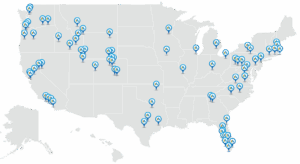A Practical and Balanced Approach to Natural Resources and Regulations
Conserving our natural resources extends beyond our regulatory obligation, it ensures that future generations have opportunities to enjoy our waterways and wildlife. When you partner with Apex Companies, you have our commitment to approach your project with both the economic and environmental aspects in mind. This practical and balanced approach takes into account the many aspects of your project that can be tricky and time-consuming. These include planning for wetland and waters delineation; evaluating protected species; tackling historical and archeological issues; navigating local, state, and federal permitting processes; and applying the intricacies of evolving regulations. That’s just a few challenges you may face.
Services Offered
With a thorough knowledge of the Clean Water Act (CWA) permitting process, our biologists and ecologists skillfully negotiate issues involving discharges to regulated waters, including:
- Jurisdictional waters and wetland determinations and delineations (federal and state compliance) in accordance with US Army Corps of Engineers (USACE) methods and regional supplement guidance
- Section 401 water quality certification
- Section 402 National Pollutant Discharge Elimination System (NPDES)
- Section 404 Nationwide Permit (NWP) authorization and individual permits
- Section 10 Rivers and Harbors Act, crossing navigable waters
- State general permits, individual permits, and joint permit programs
- Feasibility studies and impact avoidance and minimization strategies
- Regulated waters and wetland mitigation/restoration
- Municipal floodplain and buffer zone permitting


Our biologists and wildlife scientists can help you identify, evaluate, and permit projects with protected species issues through state agencies and US Fish and Wildlife Service (USFWS). Our services include:
- Threatened and endangered (T&E) species habitat studies
- Phase I, II, and III species surveys
- Section 7 and 10 Endangered Species Act (ESA) consultation and permitting support
- Migratory Bird Treaty Act compliance
- Early project scoping support (to streamline project timelines, avoid species active seasons, and minimize impacts to habitat)
- Mitigation planning
- Invasive species treatment and management
- Habitat enhancement and restoration
- Construction monitoring
We maintain a thorough understanding of archeological, historical, and tribal regulatory frameworks at the state and federal level with expertise that proves invaluable during project scoping and environmental constraints analyses. This includes historic structures, historic archeology, and prehistoric archeology experts who can provide:
- Phase I, II, and III archeological and historical resource investigations
- Section 106 coordination for federal actions
- Historic standing structures assessment
- State Historic Preservation Office (SHPO) coordination
- Tribal consultation
- Construction monitoring


We can help you successfully navigate the NEPA review process—required for all federal actions—through expert identification of environmental constraints, maintaining productive relationships with agency staff, understanding the regulatory framework and review process, and effectively coordinating with agencies and the project team to keep the project on schedule. Similarly, many states have their own requirements required for their jurisdiction. NEPA evaluation includes not only regulated waters/wetlands, protected species, and cultural resources but also evaluates air quality, noise abatement and control, protected lands, light pollution, hazardous materials, contamination, environmental justice and any/all potential impacts associated with a proposed project.
Our experience spans pipeline construction, telecommunication installations, third party property transfers, city and county renovation projects, transportation facility and corridor studies, master plans for municipal development, water supply projects, and public utility projects. We understand the importance of interdisciplinary communication and people management for sensitive projects. To do that, we maintain or develop relationships with agency staff and as needed, serve as a liaison with local community members. Our team of experts can provide initial review, Categorical Exclusion (CE), Environmental Assessment (EA), and Environmental Impact Statement (EIS), phases of the NEPA process.
- Natural channel design (Rosgen Methods) stream restoration services and stream banking
- Wetland mitigation/restoration planning, permitting, design, banking support, and post-construction monitoring
- Nutrient management and nutrient banking
- Ecological restoration and reclamation
- Ecological risk assessments
- Watershed level regulatory permitting and program management
- Protected lands and special access property support (e.g., government or preserved lands)
- Treatment wetland design, construction, and management
- Environmental support for port and waterway development, coastal and inland waterways, and tidal programs
- Emergency response, spill release, and natural disaster (e.g. fire, hurricane, etc.) support
- Habitat Evaluation Procedures (HEP) analysis and wildlife restoration planning
- USFWS Section 7 and 10 consultation support
- Migratory Bird Treaty Act (MBTA) compliance
- Wetland delineation and Section 401/402/404 permitting
- Phase I, II, and III archeological and historical resource investigations
- National Historic Preservation Act Section (NHPA) Section 106 coordination for federal actions
- Historic standing structures assessment
- Cultural resources management plans (CRMP)
- Mitigation planning
- Construction monitoring











